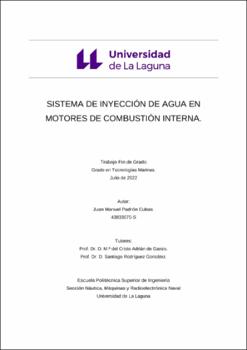Sistema de inyección de agua en motores de combustión interna.
Author
Padrón Cubas, Juan ManuelDate
2022Abstract
En este trabajo de fin de grado se va a realizar un estudio minucioso de un sistema
muy poco conocido hasta el momento y que podría reducir bastante el consumo de
combustible y las emisiones. Se trata del sistema de inyección de agua, mediante la prueba
de un vehículo en banco de prueba con el caballaje que produce sin la inyección de agua y el
que produciría con la respectiva inyección de agua, de un motor de 4 cilindros turboalimentado
ubicado en las instalaciones de un vehículo en Arafo, Santa Cruz de Tenerife, cuya ubicación
exacta desconocemos ya que hasta el momento es personal.
En dicho trabajo, se muestran estudios realizados por otras personas hace muchos
años con motores, apreciando por medio de gráficas las grandes reducciones de emisiones
que tiene un motor con tan solo llevar a cabo el sistema de inyección de agua. Se mostrará
una de las últimas tecnologías desarrolladas por la marca BMW junto con Bosch de la
aplicación de la inyección de agua en su fabuloso vehículo de 615cv con un elevado
rendimiento y muy estricto con el medio ambiente. Vemos como esto no fue un invento de
hace poco tiempo, sino que en los años 60 ya se empleaba en vehículos de carreras para dar
mucha más potencia y, aún en mi búsqueda por mucha más información de este innovador
sistema, como digo en la introducción de este trabajo, ya este sistema era usado en motores
de aviones de la Segunda Guerra Mundial.
Este sistema no solo es aplicable a motores de gasolina sino también a motores Diesel,
dado que su principal función es hacer que el motor tenga mucho más rendimiento y un menor
número de emisiones y con ello reducir la contaminación del aire que respiramos.
Tras una revisión detallada de la bibliografía, podemos apreciar que el uso del sistema
de inyección de agua resulta muy ventajoso, ya que su objetivo es conseguir cumplir las
normativas de anticontaminación que cada día son más restrictivas y que además el precio
del combustible cada vez es más elevado. In this end-of-degree project, a detailed study of a system that is little known until
now and that could significantly reduce fuel consumption and emissions is going to be
carried out. This is the water injection system, by testing a vehicle on a test bench with
the horsepower it produces without water injection and the horsepower it would produce
with the respective water injection, of a turbocharged 4-cylinder engine located in the
installations of a vehicle in Arafo, Santa Cruz de Tenerife, whose exact location we do
not know since it is personal so far.
In this work, studies carried out by other people many years ago with engines are
shown, appreciating through graphs the great reductions in emissions that an engine has
with just carrying out the water injection system. One of the latest technologies
developed by the BMW brand together with Bosch for the application of water injection
in its fabulous 615hp vehicle with high performance and very strict with the environment
will be shown. We see how this was not an invention of a short time ago, but that in the
60s it was already used in racing vehicles to give much more power and, still in my
search for much more information on this innovative system, as I say in the introduction
of this work, this system was already used in aircraft engines of the Second World War.
This system is not only applicable to gasoline engines but also to Diesel engines,
since its main function is to make the engine have much more performance and fewer
emissions and thus reduce the pollution of the air we breathe.
After a detailed review of the bibliography, we can see that the use of the water
injection system is very advantageous, since its objective is to achieve compliance with
anti-pollution regulations that are becoming more restrictive every day and that, in
addition, the price of fuel is becoming increasingly higher





